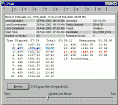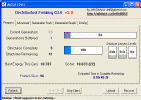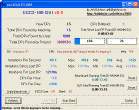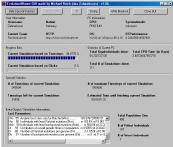| Distributed Computing Tools< /td> |
| Computer Work Calculator is an interactive web page that allows you to estimate the "fair value of a slice of CPU power," estimate the cost of purchasing that amount of power on a commercial distributed computing network, or estimate the soonest possible time that you can execute a given number of instructions for a given amount of money. | ||
| Many add-on tools for SETI@home are listed in the SETI@home FAQ. These include tools to maintain and view logs of work units, display stats about your current work unit in a small Graphical User Interface (GUI), view extended information about SETI@home team statistics, and buffer multiple work units on your system so that you don't need to connect to the SETI@home servers after completing each work unit. | ||

|
COWPump "uses WinAmp's Visualization plug-in to visualize a distributed.net client's performance." | |
|
|
SETI Timer is a web-based tool that allows you to estimate the time it will take for your system to process one SETI@Home data block. | |
|
|
Folding Timer is a web-based tool that allows you to estimate the time it will take for your system to complete one Folding@Home protein folding work unit. | |
|
|
Genome Spy
monitors and analyzes a nearly unlimited number of
Genome@Home clients in one
application window. It is written in Visual Basic 6 and is currently only
available for the Win32 platform. Version 0.98.32 is available as of January 12, 2002.
|
|
| CPH by Chris Harper is a small, simple, and fast Win98 application which monitors your Genome@Home client. It provides a lot of information about your current and cached work units, estimated work unit completion time, and your project stats. It also starts and stops your Genome@Home client. Read about the client's features and usage in an online help file. Version 0.94b of the client is available as of January 28, 2002. | ||

|
FoldMonitor
by Denis Hruza is a PerlTk script (or Win32
executable) that graphically monitors
Folding@Home version 2
clients. It also monitors
Genome@Home clients if you run it with a --genome option, and
Distributed Folding clients if you
run it with a --distribfold option. The PerlTk
version requires you to have Perl/Tk installed on your system. It supports
skins and color themes, so you can customize its look. Version 5.1.4 is
available as of May 23, 2002.
Join a FoldMonitor discussion group. |
|

|
DSpy is a Win32 executable that monitors up to ten Sengent D2OL and/or Community TSC clients. Version 0.964 R1 of the client is available as of January 21, 2003. This version supports the new protein targets that Community TSC began in January, 2003. | |

|
KDFold
monitors up to 10,000 Folding@Home, Genome@Home,
Distributed Folding and Find-a-Drug clients. It is available as an
executable or source code for Linux and Windows, and it is customizable with
auto-sizeable skins. All skinned versions have a rollup button on them
in the title bar: the button is different for each skin. Version 5.8h of
the WinKDFold (for Windows) client is available as of November 25, 2002.
Beta version 6.0 (Beta 8) of WinKDFold is available as of March 10, 2003.
Beta version 6.0 (Beta 8) of the LinKDFold (for Linux) client is available as
of March 10, 2003.
Join the KDFold discussion forum. |
|

|
Google Compute,
a feature of the
Google Toolbar, volunteers your
computer to work on distributed computing projects when it would otherwise
be idle. It currently supports the
Folding@Home project. In the future it will support other projects and
will use your computer to "improve Google and its services." You can enable
and disable this feature of the Google Toolbar at any time, and you can access
your stats for the projects you are contributing to. All Google Compute
volunteers are grouped into the Team Google team for projects that support
teams.
The Google Toolbar requires a Win32 platform with Internet Explorer version 5 or later. It creates a toolbar underneath the Internet Explorer toolbar in Internet Explorer. |
|

|
Distributed Folding GUI (dfGUI)
provides a graphical way for Windows users to start,
stop, and run the Distributed Folding
client software. It shows you how many structures have been completed in the
current generation, the best energy for the current generation, and an
estimated time for when the block will be completed. It also lets you change
the options used for the Distributed Folding client. Finally, it shows you
statistics and graphs about your previous generations.
The Distributed Folding client is run in a separate DOS window, so you can still watch the ANSI art it creates when it is running. dfGUI also supports running the Distributed Folding client as a service. Version 3 of the tool is available for Windows as of June 16, 2003. A version for Linux should be available soon. Note that version 3 only supports the Phase 2 Distributed Folding client. Source code for the tool is available from the website. |
|
|
Folding@Home Grapher
"graphs and analyzes
Folding@Home team statistics
over time." "The current functionality includes the ability to download and
store team statistics from the Folding@Home site and display a graph showing
the performance of any subset of teams."
Alpha version 0.0.2 of the tool is available as of July 25, 2002. The tool is currently developed for Linux. See installation instructions for the tool. |
||

|
ECC2-109 GUI
provides a graphical way for Windows users to start,
stop, and run the ECC2-109 official
client software or the ecc2109c
replacement client software. It shows you how many distinguished points you
have found and how fast the distinguished points are being found, and displays
benchmarking information about your system (you can write this benchmarking
information to a file which you can share with friends).
The ECC2-109 or ecc2109c client is run in a separate DOS window or as a service, so you can still watch the client window directly when it is running. Version 0.8 of the tool is available as of January 23, 2003. Source code for the tool will be available after version 1.0. |
|

|
ECC2-109 GUI
provides a graphical way for Windows users to view
statistics from multiple instances of the
ECC2-109 client software. It shows you how many distinguished points
each instance has found and how many points are being tested per second, and
it allows you to start and stop remote instances and to edit the .cfg file
via the GUI.
The ECC2-109 client is run in a separate DOS window or as a service, so you can still watch the client window directly when it is running. Version 0.2 of the tool is available as of November 20, 2002. |
|

|
FlyGUI,
written by Peter Rheinhold, provides a graphical way
for Windows users to view statistics from a single instance of the
ECC2-109 client software. It shows you
how many distinguished points the client has found and how many points are
being tested per second, and it allows you to start and stop the client via
the GUI. It is also skinnable, so you can create a customized look for it.
Version 0.61 of the tool is available as of February 4, 2003. |
|
|
ecc2109c,
written by SWfreak, is a replacement command-line
client for Windows users of the official
ECC2-109 command-line client. It implements
many features requested
by project participants. Jeff Gilchrist's
ECC2-109 GUI tool can be used with
this client.
Version 1.0 of the client is available as of February 23, 2003. |
||

|
evolution@home GUI,
written by Michael Reich of team
Rechenkraft.net, provides a Windows
graphical interface for the semi-automated version of the
evolution@home client.
Version 1.1b of the client is available as of April 11, 2003. |
|
|
|
DCMonitor, written by Allan Greenwood, monitors multiple clients for the following projects: ECC2-109, Distributed Folding, DPAD, GIMPS, SETI@home, Folding@home, Seventeen or Bust, and Lifemapper. It is useful for people who run multiple clients from multiple projects on a LAN. | |
| Past Distributed Computing Tools | ||
| Top... |